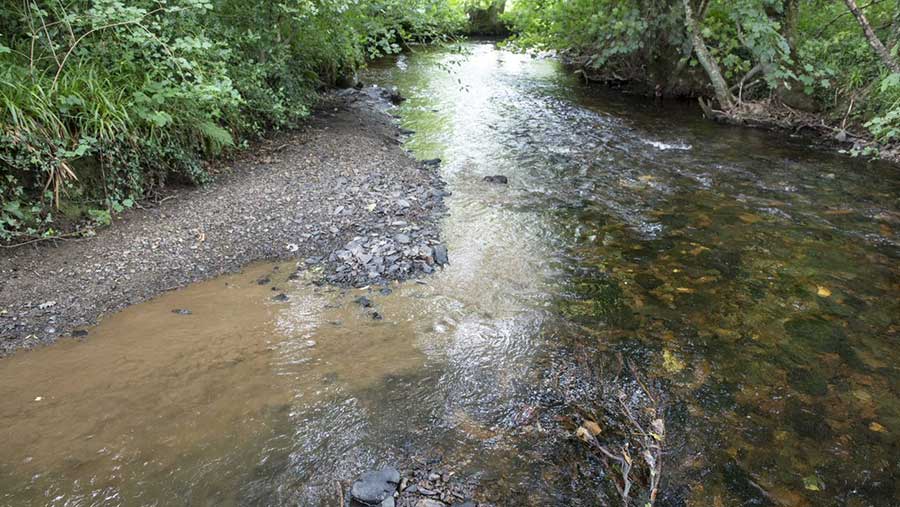Climate change will worsen farm water pollution, study shows
 © Rothamsted Research
© Rothamsted Research Farmers face an uphill battle to stop water pollution from their land as spells of extreme wet winter weather become more common as a result of climate change.
A study of river water quality by Rothamsted Research, during one of the UK’s wettest ever winters, revealed a massive increase in agricultural pollution from sites within the upper reaches of the River Taw catchment in Devon.
See also: Chris Bennett: Cut farmers some slack on water quality
The researchers analysed four fields on their test farm, and three other nearby sites within the catchment, and found that pollutants washing from the farmland increased dramatically during the winter of 2019-20, which included the wettest February on record, with about 209mm of rain falling.
The amount of soil washed off arable fields – and the associated environmental clean-up costs – showed a twentyfold increase on average, while climate predictions for their study site suggest this sort of weather will become more common in the future.
Arable challenges
The data also illustrate how arable farmland can be a much greater contributor to water pollution than lowland grazing livestock, after the researchers converted fields at the test farm to simulate what might happen if reduced demand for meat resulted in more arable land.
Hydrologist professor Adie Collins, who leads Rothamsted’s research in this area, said: “These changes in autumn and winter rainfall are elevating runoff and the water pollution problems arising from modern farming.
“Sadly, current on-farm mitigation strategies, including those subsidised by agri-environment schemes, aren’t working very well.”
Defra said one of the best ways to deal with pollution from agriculture was through catchment-sensitive farming – a partnership between Defra, Natural England and the Environment Agency which provides free advice to farmers to help them reduce pollution through management of farmyard manure and soils, among other things.
A Defra spokesman said: “We have almost doubled the budget to £30m and it will be rolled out to 100% of farmers in England by 2023.”
The NFU agreed that Catchment Sensitive Farming measures were effective and had contributed to a 75% reduction in serious pollution incidents since 2000.
“British farmers are committed to making improvements on their farms to protect the environment and have already made significant progress.
“Unfortunately, extreme rainfall events do have significant impacts on farms, and this can include increased displacement of soil and nutrients,” said a spokesperson.
“Farmers are on the front line of these extreme weather events and, as these become more frequent, it’s crucial the government’s net-zero and water management strategies are joined up to ensure farmers are well equipped to manage these events as best they can.
“We must also recognise the importance of using the right land for the right type of farming. For example, in the UK we have a lot of grassland that is only suitable for grazing livestock.
“Moving forward, it’s crucial that future farming schemes enable farmers to invest in new technology and infrastructure to tackle potential pollution issues.”
Study findings
On the farm, grassland monthly average sediment losses increased from 92kg-116kg/ha between 2016 and 2019, to a 281kg-333kg/ha range in 2019-20, whereas corresponding losses from grassland converted to cereal production rose from 63kg-80kg/ha to 2,124kg-2,146kg/ha – a more than twentyfold increase.
Catchment site sediment losses increased from 8kg-37kg/ha in 2018 to 15kg-173kg/ha during the 2019-20 wet-weather period.
Monthly average nitrate losses from the farm went from 0.39kg-1.07kg/ha in the 2016-2019 period to 0.7-1.35kg/ha during the winter of 2019-20. Losses from grassland ploughed up for cereals increased from 0.63kg-0.83kg/ha to 2.34kg-4.09kg/ha.
At the River Taw catchment sites, nitrate losses increased during the 2019-20 extreme wet-weather period to 2.04kg-4.54kg/ha.
